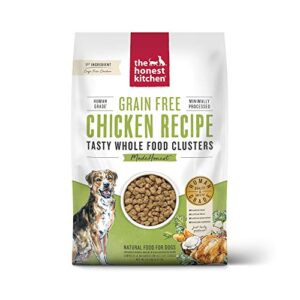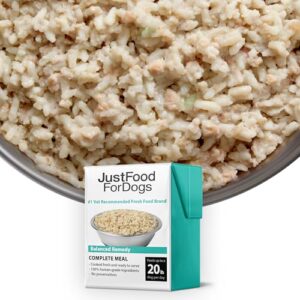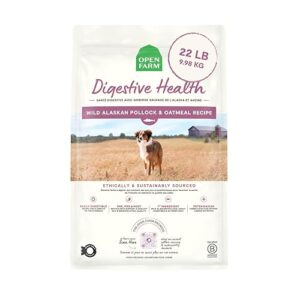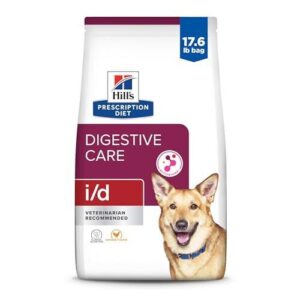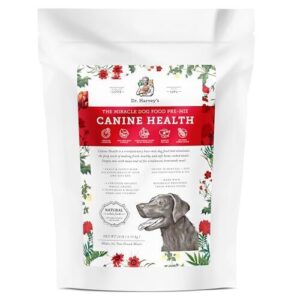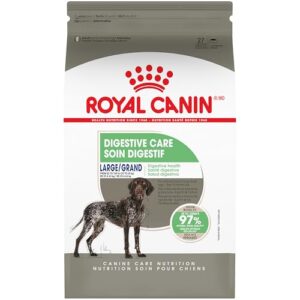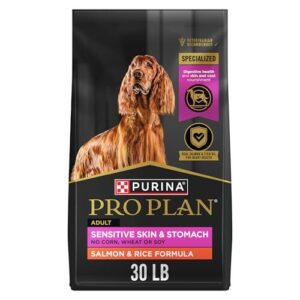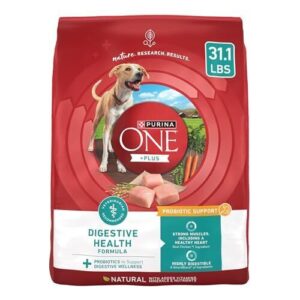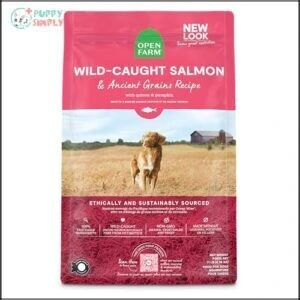This site is supported by our readers. We may earn a commission, at no cost to you, if you purchase through links.

Your dog’s digestion wasn’t designed for the modern kibble bag. Most commercial dog foods contain beef, dairy, chicken, and wheat—the very ingredients responsible for over 80% of canine food sensitivities.
When your dog’s stomach rebels against these common proteins and grains, you’ll notice the signs: frequent vomiting, chronic diarrhea, constant paw licking, or that telltale scooting across the floor. These aren’t just minor inconveniences. They’re your dog’s immune system launching a full-scale response against ingredients it perceives as threats.
Finding the right dog food for sensitive stomachs and allergies requires more than switching brands—it demands understanding which proteins your dog tolerates, how digestive enzymes and prebiotics support gut healing, and why novel protein sources often succeed where traditional formulas fail.
Table Of Contents
- Key Takeaways
- Causes of Sensitive Stomachs and Allergies in Dogs
- Signs Your Dog Has a Sensitive Stomach
- Key Ingredients to Avoid and Choose
- Top 9 Dog Foods for Sensitive Stomachs and Allergies
- 1. Honest Kitchen Chicken Grain Free Clusters
- 2. JustFoodForDogs Balanced Remedy Dog Food
- 3. Open Farm Digestive Health Dog Food
- 4. Hill’s i/d Digestive Care Dog Food
- 5. Dr. Harvey’s Canine Health Miracle Food
- 6. Royal Canin Large Breed Digestive Care
- 7. Purina Pro Plan Salmon and Rice
- 8. Purina One Digestive Health Chicken
- 9. Open Farm Salmon Ancient Grains Dog
- Choosing and Transitioning to Sensitive Stomach Dog Food
- Frequently Asked Questions (FAQs)
- What is the best thing to feed a dog with a sensitive stomach?
- What dog food is easiest on the stomach?
- What to feed senior dogs with digestive issues?
- What food should I feed my dog with food allergies?
- How can I prevent sensitive stomachs in puppies?
- What are the long-term effects of food allergies in dogs?
- How do I choose the best protein source for allergies?
- Can I give my dog treats with sensitive stomach issues?
- Can homemade diets effectively manage food sensitivities?
- How long until symptoms improve after switching?
- Conclusion
Key Takeaways
- Most commercial dog foods contain beef, dairy, chicken, and wheat—the four ingredients responsible for over 80% of canine food sensitivities, with beef alone accounting for 34% of confirmed allergic reactions.
- Food allergies involve an immune response that causes persistent itching on ears, paws, and face alongside digestive issues, while food intolerances skip the immune trigger and produce mainly gastrointestinal symptoms without relentless skin problems.
- Novel protein sources like venison, duck, or rabbit paired with limited-ingredient formulas using just one protein and one carbohydrate create a controlled environment that helps identify trigger foods while reducing allergic reactions.
- Successful diet transitions require a gradual seven-to-ten-day shift mixing 25% new food with 75% current food initially, paired with daily monitoring of stool consistency and a food diary tracking symptoms since most dogs relapse within five to fourteen days of eating trigger ingredients.
Causes of Sensitive Stomachs and Allergies in Dogs
Understanding what causes your dog’s digestive troubles is the first step toward finding real relief. Several factors can trigger sensitivities, from the ingredients in their bowl to their genetics and daily environment.
Let’s look at the most common causes so you can identify what might be affecting your dog.
Common Food Ingredients Triggering Sensitivities
Certain ingredients act as common culprits behind food sensitivities in dogs. When your dog’s immune system reacts to specific proteins or additives, digestive upset and skin issues often follow.
- Protein allergens: Beef leads confirmed cases at 34%, followed by dairy at 17% and chicken at 15%
- Grain sensitivities: Wheat accounts for 13% of food intolerances in affected dogs
- Additives and preservatives: BHA, BHT, and artificial dyes can trigger reactions
- Cross-reactivity: Dogs sensitive to beef often react to lamb due to shared proteins
To diagnose these issues, vets often recommend a diet elimination trial.
Genetic and Breed Predispositions
Your dog’s breed carries genetic blueprints that can predispose them to food allergies and digestive sensitivities. German Shepherds, Labrador Retrievers, and French Bulldogs face elevated polygenic risk for atopic dermatitis, with candidate genes affecting skin barrier function and immune response.
Certain dog breeds carry genetic blueprints that predispose them to food allergies and digestive sensitivities from birth
German Shepherds show particularly high rates of IgA deficiency—a mucosal immune weakness that compromises gut defense. One key factor is epidermal barrier dysfunction, which contributes to the pathogenesis of canine atopic dermatitis.
If your dog belongs to a high-risk breed, discuss elimination diet trials with your veterinarian early.
Environmental and Lifestyle Factors
Beyond genetics, where your dog spends time shapes their allergy risk substantially. Urban environments carry higher allergy scores than rural settings, likely due to reduced microbial exposure and increased environmental stressors like pollutants and chemical toxins. Dogs with regular outdoor access and farm animal contact show protective effects against sensitivities, while shelter conditions—crowding, contamination, parasites—increase gastrointestinal disease risk considerably.
- Urban vs. Rural Living: Urban-resident dogs show substantially higher allergy severity than rural counterparts
- Microbial Diversity: Greater outdoor exposure and nature-oriented lifestyles provide allergy protection through diverse microbial contact
- Environmental Contaminants: Pollutants, pesticides, heavy metals, and highly processed foods disrupt digestive function
- Shelter and Crowding Stress: Kenneled environments increase parasite exposure and stress-related immunocompromise
- Routine Consistency: Stable feeding schedules and exercise patterns reduce stress-induced digestive upset
Age-related Digestive Changes
As your dog ages, subtle physiological shifts compound digestive vulnerability. Motility slowdown delays gastric emptying, especially on high-fat diets, while microbiome shifts reduce beneficial Lactobacilli to just 30% prevalence in senior dogs.
Nutrient absorption may falter when chronic disease like pancreatitis or exocrine insufficiency emerges—common after age five.
These changes mean dog food for different life stages matters: digestive issues in seniors often demand gentler, easily digested nutritional needs adapted to compromised immune response and digestive health.
Signs Your Dog Has a Sensitive Stomach
Recognizing the signs of a sensitive stomach early can help you address your dog’s discomfort before it becomes a bigger issue.
The symptoms range from obvious gastrointestinal troubles to subtle behavioral changes that might seem unrelated at first.
Here’s what to watch for in your dog’s daily routine and health.
Gastrointestinal Symptoms to Watch For
Think of your dog’s digestive tract as a sensitive early warning system—when something’s off, the signs won’t stay hidden for long. Watch for these telltale gastrointestinal symptoms:
- Vomiting frequency beyond the occasional upset (nearly 45% of dogs with diarrhea also vomit)
- Diarrhea consistency ranging from soft to watery, sometimes with visible blood
- Stool color changes—black tarry stools or fresh red blood signal trouble
- Abdominal pain coupled with appetite changes and lethargy
These signs of a sensitive stomach, including bloating and constipation, deserve your attention.
Behavioral Indicators of Digestive Discomfort
Your dog’s body language speaks volumes when digestive issues strike. Watch for postural changes like the “praying position”—chest lowered, hindquarters elevated—which signals abdominal pain.
Restlessness, excessive licking or drooling (oral behaviors), and reduced activity levels all point toward gut discomfort.
Dogs may also withdraw from interaction, vocalize when touched near the belly, or resist being picked up—clear vocalization cues that food sensitivities or allergies are causing real distress.
Differentiating Food Allergies From Intolerances
True food allergies involve an immune response, often producing persistent pruritus—itchy skin on ears, paws, or face—alongside gastrointestinal signs.
Food sensitivities, or intolerances, skip the immune trigger and cause mainly digestive upset like vomiting or diarrhea without relentless itching.
Diagnostic tests like elimination diets help pinpoint trigger types, since common food allergens rarely show up on blood panels alone.
When to Consult Your Veterinarian
Persistent symptoms that stretch beyond 24–48 hours signal it’s time to call your veterinarian, because ongoing fluid loss can quickly spiral into dangerous dehydration. Red flag signs demand immediate veterinary care:
- Blood in vomit or stool – suggests ulceration or hemorrhagic disease
- Refusal to eat or drink for 24+ hours – compounds dehydration risk
- Lethargy paired with appetite changes – may reveal underlying conditions beyond simple food allergies
Veterinarian recommendations emphasize early assessment to prevent life-threatening complications.
Key Ingredients to Avoid and Choose
When you’re shopping for dog food, reading the ingredient label can feel like deciphering a foreign language. Some ingredients act as troublemakers for sensitive stomachs, while others work like a soothing balm for your dog’s digestive system.
Let’s break down what to steer clear of and what to look for when choosing the right food for your pup.
Common Allergens in Commercial Dog Food
When you scan commercial dog food ingredients, you’re looking at a minefield of common dog allergens. Beef prevalence leads the pack, affecting 34% of dogs with food allergies, followed by dairy sensitivities at 17% and chicken reactions at 15%.
Wheat intolerance affects 13% of allergic dogs, making grain alternatives increasingly popular. Lesser culprits include soy, lamb, corn, and egg.
Beneficial Ingredients for Sensitive Digestion
Your dog’s sensitive stomach needs intentional nutritional support—ingredients that soothe, strengthen, and stabilize the gut.
Digestive health formulas now combine multiple tools: prebiotic fibers like beet pulp or oats to feed beneficial bacteria, probiotics delivering billions of live microbes per serving, and highly digestible carbs such as white rice or oatmeal that ease digestion.
Omega fatty acids from fish oil calm intestinal inflammation, while whole-food inclusions like pumpkin provide gentle fiber for gut health.
The Role of Novel Proteins and Limited-ingredient Diets
When your dog hasn’t encountered a protein before—venison, duck, rabbit—the immune system is less likely to mount an allergic response. That’s the power behind novel protein diets.
Pair that with limited-ingredient formulas using just one protein and one carbohydrate, and you’ve created a controlled environment to identify food allergies while reducing digestive upset and contamination risks.
Importance of Prebiotics, Probiotics, and Fiber Sources
Limited-ingredient diets set the stage, but gut health seals the deal. Prebiotics like chicory-derived inulin feed beneficial bacteria, while probiotic strains—think Lactobacillus at 10 billion CFU daily—restore balance in your dog’s gut microbiome. Fiber benefits extend beyond firmer stools: soluble sources produce short-chain fatty acids that nourish the intestinal lining. Together, these ingredients create synbiotic effects that support long-term digestive health.
- Prebiotics fuel beneficial bacteria growth and lower fecal pH to discourage harmful pathogens
- Probiotic strains like Enterococcus faecium colonize the gut for months after supplementation stops
- Fiber benefits include improved stool consistency and regulated intestinal transit time
- Synbiotic effects combine prebiotics with probiotics for enhanced survival and colonization
- Digestive enzymes work alongside fiber to break down nutrients and ease gastrointestinal discomfort
Top 9 Dog Foods for Sensitive Stomachs and Allergies
Finding the right food for your dog’s sensitive stomach doesn’t have to feel like guesswork.
The products below combine easily digestible proteins, gentle carbohydrates, and gut-supporting ingredients to help reduce digestive upset and allergic reactions.
Each option offers a different approach, so you can choose what fits your dog’s specific needs and preferences.
1. Honest Kitchen Chicken Grain Free Clusters
If your dog’s digestive system acts like a finicky gatekeeper, Honest Kitchen Chicken Grain Free Clusters may offer relief. This human-grade dog food uses cage-free chicken, probiotics, and gentle carbohydrates like potatoes and peas to support sensitive stomachs.
The cold-pressed processing method preserves nutrients while meeting AAFCO standards for all life stages. With 26% protein and added salmon oil for skin health, it tackles both digestive benefits and allergies.
Note that chicken remains a potential allergen for some dogs, and the company recalled certain formulas in 2013 due to ingredient contamination.
Best For: Dogs with sensitive stomachs or grain sensitivities who need gentle, nutrient-dense nutrition without artificial additives.
- Human-grade ingredients with cage-free chicken, probiotics, and omega-rich oils support digestion and skin health
- Cold-pressed processing preserves more nutrients than traditional high-heat kibble while meeting AAFCO standards for all life stages
- No fillers, artificial preservatives, or meat meals—just whole-food ingredients like pumpkin, flaxseed, and chia for gut support
- Chicken and egg ingredients may trigger reactions in dogs with poultry allergies
- Expensive at $89.42 for a 20 lb bag compared to conventional kibble options
- Minimal processing can result in crumbly texture with powder at the bottom of the bag
2. JustFoodForDogs Balanced Remedy Dog Food
When your dog needs a gentler approach than chicken-based formulas, JustFoodForDogs Balanced Remedy provides a low-fat, low-residue alternative built on ground turkey and white rice. This human-grade option delivers digestibility factors that support post-operative recovery and pancreatitis management, with clinical applications extending to chronic gastrointestinal upset.
Available in both frozen and shelf-stable formats, it sidesteps common allergens like corn and wheat while meeting AAFCO maintenance standards. The limited-ingredient design prioritizes ingredient quality over complexity, making it suitable for dogs requiring veterinary care-guided dietary positioning during acute digestive episodes.
Best For: Dogs recovering from surgery or experiencing digestive issues like pancreatitis who need a bland, low-fat diet that’s easier on sensitive stomachs than chicken-based options.
- Human-grade turkey and rice formula with minimal ingredients reduces allergen exposure while meeting complete nutrition standards for adult dogs
- Available in both frozen and shelf-stable formats for flexibility, making it practical for travel or homes without freezer space
- Low-fat, low-residue composition supports digestive recovery and may improve stool quality in dogs with chronic upset
- Premium pricing puts it out of reach for many pet owners, especially those feeding larger dogs long-term
- Some dogs reject the flavor, and quality control complaints about packaging or freshness appear in customer reviews
- Not formulated for puppies or pregnant dogs, limiting its use to adult maintenance feeding only
3. Open Farm Digestive Health Dog Food
For dogs showing signs of protein-driven sensitivities, Open Farm Digestive Health Wild Pollock & Oatmeal offers an alternative built on wild-caught Alaskan pollock instead of traditional poultry.
This AAFCO-compliant formula prioritizes ingredient traceability—every protein source traces back to its origin—while delivering 28% crude protein and prebiotics to support digestive health.
The brand’s reputation rests on never experiencing a recall and maintaining rigorous third-party safety testing.
At 10% fat with omega-3-rich marine ingredients, it tackles sensitive stomachs through an easily digestible formulation rather than prescription-level restriction.
Best For: Dogs with sensitive stomachs who need a fish-based protein alternative to chicken or beef, especially when you want traceable ingredients and prebiotic support without moving to prescription food.
- Wild-caught Alaskan pollock as the first ingredient with full traceability back to source, plus zero recalls in company history
- Includes prebiotics from pumpkin and oats to support gut bacteria, with 28% protein and omega-3s for digestive and skin health
- AAFCO-compliant formula that’s vet-formulated specifically for sensitive stomachs, without common allergens like corn, wheat, soy, or poultry
- Premium pricing makes it significantly more expensive than conventional dog food brands
- Strong fishy smell from the marine ingredients can be off-putting for some owners and dogs
- Some dogs may not take to the taste, and gradual transition is necessary to avoid digestive upset even with this sensitive-stomach formula
4. Hill’s i/d Digestive Care Dog Food
If you’re searching for a prescription food trusted by veterinarians, Hill’s i/d Formulation stands out for Digestibility Support and targeted Clinical Uses. Its ActivBiome+ blend of prebiotic fibers helps restore gut balance for dogs with digestive issues or sensitive stomachs.
Product Variants range from dry kibble to stew-style cans, so you can match your dog’s preference.
While Hill’s Recall History includes a notable 2019 event, their quality controls remain strong, making this dog food a staple among therapeutic veterinary diets.
Best For: Dogs with sensitive stomachs, chronic digestive issues, or those recovering from gastrointestinal surgery who need veterinarian-prescribed therapeutic nutrition.
- Highly digestible formula with ActivBiome prebiotic blend helps quickly restore gut balance and reduce symptoms like vomiting, diarrhea, and bloating
- Available in multiple formats (dry kibble, canned, stew-style) so you can find what your dog actually wants to eat
- Enriched with extra B vitamins and electrolytes to replace nutrients lost during digestive upsets
- Requires a veterinarian prescription, which adds an extra step and potential cost before you can purchase
- More expensive than regular dog food, and some buyers feel the bag size doesn’t justify the price
- Company had a major recall in 2019 affecting millions of cans due to excessive vitamin D levels
5. Dr. Harvey’s Canine Health Miracle Food
You can take control of every ingredient your dog eats with Dr. Harvey’s Canine Health Miracle Food, a dehydrated base mix that forms the foundation of home-style diets. This customizable meal system contains 9 vegetables and 6 organic grains, letting you add the protein and oil that suit your dog’s allergies or sensitivities.
Studies show appropriately formulated homemade diets improved symptoms in 94–95% of dogs with gastrointestinal or skin conditions. Veterinary guidance ensures balanced nutrition when you prepare these meals.
Best For: Dog owners who want complete control over ingredients to manage food allergies, sensitivities, or chronic digestive issues through a customizable, vet-guided meal system.
- You choose the protein and oil, making it ideal for elimination diets or managing specific allergies—no hidden ingredients.
- Studies show 94–95% of dogs with GI or skin conditions improved on properly formulated homemade diets like this.
- Made with organic grains, 9 vegetables, and no fillers or preservatives—just whole-food ingredients you can see.
- Requires meal prep and planning since you’re mixing, rehydrating, and adding protein yourself—not a grab-and-go option.
- More expensive upfront than kibble, and you’ll need to buy fresh protein and oil separately.
- Needs veterinary guidance to ensure balanced nutrition, especially for long-term feeding or dogs with health conditions.
6. Royal Canin Large Breed Digestive Care
Royal Canin Large Breed Digestive Care targets adult dogs over 56 pounds who struggle with digestive health issues. The formula uses highly digestible proteins and a blend of prebiotics and fibers to support stool quality—internal studies found 97% of dogs achieved ideal results.
However, the ingredient analysis reveals potential concerns for allergies: it contains chicken, corn, and wheat gluten, which are common allergens. This makes it suitable for large breeds with mild sensitivities but not appropriate for dogs with confirmed food allergies requiring strict elimination diets.
Best For: Large breed adult dogs over 56 pounds with mild to moderate digestive sensitivities who need consistent stool quality support but don’t have confirmed food allergies.
- Highly digestible protein formula with prebiotics achieved 97% optimal stool quality in internal studies
- Specific fiber blend (beet pulp and psyllium husk) helps balance intestinal flora and firm up stools
- Complete nutrition for long-term use in large breeds with sensitive stomachs
- Contains common allergens like chicken, corn, and wheat gluten, making it unsuitable for dogs with food allergies
- Higher price point compared to standard kibble without guaranteed allergy-safe formulation
- Not a therapeutic or hypoallergenic diet—requires veterinary guidance for dogs with severe digestive issues
7. Purina Pro Plan Salmon and Rice
If your pup turns up their nose at poultry-based formulas, Purina Pro Plan Sensitive Skin & Stomach offers salmon as the first ingredient—a novel protein source for many dogs with allergies. This dog food combines easily digestible oatmeal and rice with guaranteed live probiotics to support your pet’s sensitive stomach.
The formula delivers omega fatty acids from fish oil and sunflower oil, promoting skin health while avoiding corn, wheat, and soy. Ingredient analysis confirms it meets AAFCO standards for adult maintenance, providing roughly 467 calories per cup with balanced digestibility factors.
Best For: Dogs with chicken or beef sensitivities who need digestive support and skin relief from a single formula that uses salmon as the primary protein.
- Real salmon and fish meal provide omega-3s for skin health while serving as an alternative protein for dogs who react to chicken or beef
- Live probiotics and prebiotic fiber work together to support gut health and improve stool quality in dogs with sensitive stomachs
- No corn, wheat, or soy means fewer potential triggers while still including digestible grains like rice and oatmeal
- More expensive than standard dog foods, which adds up for long-term feeding
- Some owners report quality control issues including bugs in bags, raising concerns about manufacturing consistency
- Won’t help with environmental allergies—if your dog’s skin issues come from pollen or dust, this won’t fix the problem
8. Purina One Digestive Health Chicken
Purina ONE +Plus Digestive Health Formula puts real chicken at the top of the ingredient list, delivering 25% minimum crude protein with a highly digestible recipe designed for your dog’s sensitive stomach. The formula includes 600 million CFU per pound of Bacillus coagulans—a probiotic that aids gut wellness—and meets AAFCO standards through actual feeding trials.
At approximately 384 calories per cup, this grain-inclusive dog food provides balanced nutrition, though ingredient analysis reveals whole grain wheat and soybean meal, which can be allergens for some pets.
Best For: Dogs with sensitive stomachs or digestive issues who need a probiotic-enriched formula with real chicken as the main protein source.
- Contains 600 million CFU per pound of probiotics specifically for digestive support, backed by AAFCO feeding trials
- Real chicken is the first ingredient with 25% minimum crude protein and balanced omega-6 fatty acids for skin and coat health
- No artificial flavors or preservatives, plus includes natural glucosamine sources for joint support
- Multiple customer reports of quality control issues, including bugs (mealworms and moths) found in bags
- Contains common allergens like wheat and soybean meal that may trigger sensitivities in some dogs
- Higher plant-based protein from corn gluten meal and soybean meal, which dilutes the animal protein percentage
9. Open Farm Salmon Ancient Grains Dog
If your dog needs a break from poultry, Open Farm’s Wild-Caught Salmon & Ancient Grains offers an Ocean Wise–recommended recipe sourced from the North Pacific. This sensitive stomach dog food delivers 27% protein with omega-3s for skin support and ancient grains like oats and quinoa instead of legumes—ideal if your pup reacts to peas or potatoes.
Prebiotic fibers from pumpkin and chicory root aid digestibility, while Open Farm’s traceability system lets you track every ingredient back to its origin, ensuring transparency in what you’re feeding.
Best For: Dogs with sensitive stomachs or allergies to poultry and legumes who need high-quality fish protein with ancient grains for easy digestion.
- Wild-caught Pacific salmon with omega-3s supports healthy skin, coat, and reduced inflammation
- Ancient grains (oats, quinoa, sorghum) plus prebiotic fibers make it gentle on digestion and ideal for pups sensitive to peas or potatoes
- Full ingredient traceability lets you track each component back to its source for total transparency
- Pricier than many comparable dog foods on the market
- Some dogs may be picky eaters and not take to the flavor right away
- A few pups may get bored with the same recipe over time and need variety
Choosing and Transitioning to Sensitive Stomach Dog Food
Finding the right food for your dog’s sensitive stomach is only half the battle—knowing how to introduce it safely makes all the difference. A thoughtful shift protects your dog’s digestive system while giving you time to determine whether the new diet is working.
Here’s what you need to remember when choosing and switching to a sensitive stomach formula.
Assessing Your Dog’s Dietary Needs and Allergies
Pinpointing your dog’s dietary needs starts with recognizing allergy symptoms like persistent pruritus signs—itching around ears, paws, or face—and gastrointestinal issues. A proper dietary assessment distinguishes food allergies in dogs from food intolerance.
Your veterinarian can recommend elimination diets, the best practice for allergy diagnosis, usually lasting eight to twelve weeks to accurately identify food sensitivities triggering your dog’s discomfort.
How to Safely Switch Your Dog’s Food
Once you’ve identified food sensitivities through an elimination diet and veterinary consultation for dogs, start shifting the dog to different food slowly. Use a gradual shift over seven to ten days, mixing strategies that begin with 25% new food and 75% current food. For severe sensitivities, extend this to two weeks.
Allergy management requires strict ingredient control during switches. Health monitoring and understanding microbiome impact help prevent digestive upset.
Monitoring Your Dog’s Response to New Diets
After switching your dog’s food, track stool consistency daily using a seven-point scale—aim for smooth, sausage-shaped results. Keep a food diary noting any digestive issues or allergy symptoms, and weigh your dog weekly to catch weight changes early.
Most dogs with food allergies relapse within five to fourteen days of eating trigger ingredients, so watch for signs and schedule a veterinary consultation if problems persist.
Tips for Long-term Digestive Health Management
Long-term gut health starts with consistent feeding schedules—86% of dogs on fixed meal times experience fewer digestive upsets.
Maintain ideal weight through portion control, as obesity increases chronic gastrointestinal disease risk.
Gradually introduce fiber and prebiotics to support beneficial bacteria, while omega-3s reduce inflammation over 12–16 weeks.
Regular vet oversight, including parasite screenings, catches food sensitivities early and prevents minor issues from becoming chronic problems.
Frequently Asked Questions (FAQs)
What is the best thing to feed a dog with a sensitive stomach?
The best thing to feed your dog with a sensitive stomach is a bland diet of boiled chicken and white rice.
This simple combination provides easily digestible protein and carbohydrates that soothe digestive upset.
What dog food is easiest on the stomach?
Dog food easiest on your dog’s digestive system features highly digestible protein and carbohydrate sources exceeding 85% digestibility, moderate fat content around 10–15%, and controlled fiber from ingredients like rice or beet pulp.
What to feed senior dogs with digestive issues?
Senior dogs with digestive issues benefit from easily digestible proteins, moderate fat levels, and controlled fiber. Feeding smaller, more frequent meals aids nutrient absorption.
Always consult your veterinarian before selecting specialized digestive care diets for older dogs.
What food should I feed my dog with food allergies?
If your dog has food allergies, you’ll need hypoallergenic options like hydrolyzed diets or novel protein sources—think venison or duck.
Elimination trials under veterinary guidance help pinpoint triggers, with ingredient sourcing promoting long-term health.
How can I prevent sensitive stomachs in puppies?
Your puppy’s digestive health starts with a complete, balanced early-life diet, gradual transitions between foods, microbiome support through probiotics, careful stress management, and consistent hydration care using easily digestible ingredients.
What are the long-term effects of food allergies in dogs?
Unmanaged food allergies in dogs trigger chronic inflammation that damages the gut microbiome and skin, leading to secondary infections, gastrointestinal issues, and systemic effects that greatly reduce quality of life over time.
How do I choose the best protein source for allergies?
Think of allergens like invisible tripwires—each protein your dog hasn’t encountered becomes safer terrain.
Start with novel protein sources or hydrolyzed proteins during elimination diets, prioritizing single-source proteins with proven digestibility factors.
Can I give my dog treats with sensitive stomach issues?
Yes, but choose wisely. Treats should stay under 10% of daily calories.
Start with single-ingredient, novel protein treats or hydrolyzed options. Test one at a time, watching for allergens or digestive upset before introducing more.
Can homemade diets effectively manage food sensitivities?
Homemade dog food, when properly formulated by a veterinary nutritionist, can effectively manage food sensitivities. However, most recipes lack essential nutrients.
Strict diet adherence and ingredient sourcing under veterinary oversight are crucial to prevent nutrient deficiencies while addressing sensitivities.
How long until symptoms improve after switching?
Patience is a virtue, especially when addressing food sensitivities. Initial GI changes generally ease within one to three weeks, while skin improvement timeframe extends eight to twelve weeks on elimination diets for food allergies.
Conclusion
Think of your dog’s gut as a garden that’s been overrun with weeds. The right dog food for sensitive stomachs and allergies clears that ground, planting digestible proteins and gut-healing probiotics instead. You’ve seen the ingredients that harm and those that heal.
Now comes the shift—gradual, measured, and monitored. Your dog’s digestive comfort depends on your willingness to choose nutrition over convenience, patience over quick fixes.
- https://pmc.ncbi.nlm.nih.gov/articles/PMC6380261/
- https://www.purinainstitute.com/centresquare/therapeutic-nutrition/food-allergy-and-food-intolerance
- https://nutritionrvn.com/2024/08/25/food-allergy-guide/
- https://todaysveterinarypractice.com/nutrition/food-allergy-diagnostics-therapeutic-food-options/
- https://www.merckvetmanual.com/integumentary-system/food-allergy/cutaneous-food-allergy-in-animals






